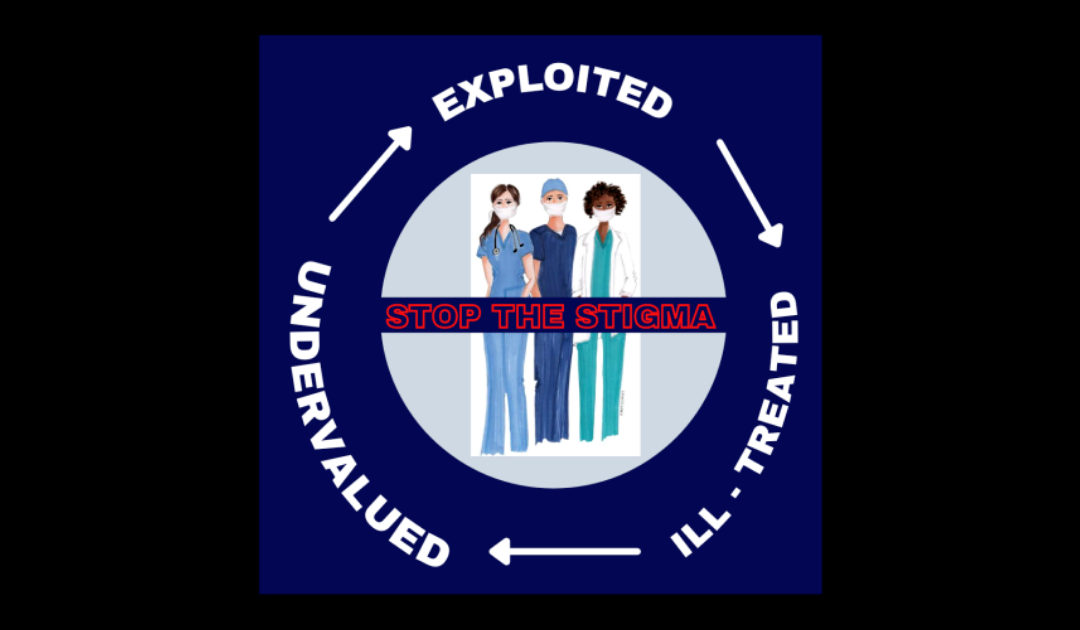Trigger Warnings – Violence, Assault.
Our Healthcare Workers have established a system of protection and support for us, by risking their lives every single day, during this pandemic. With hard work and determination, they refuse to give up and continue to do their jobs in the face of any obstacles. They are not only facing the rage of this pandemic as humans but as healthcare professionals whose sole duty is to save lives. In return, all they ask for is a safe working environment, a steady wage, along security and respect for their job. Unfortunately, while we are pedestalizing our healthcare workers we forget that they too just want our support and protection for their lives. Rightfully so, they are our heroes with or without a pandemic, but sometimes all heroes want is to be safe. They have been essential but gravely undervalued during this pandemic.
Healthcare workers are suffering at the hands of blatant stigmatisation, abuse and threat to their lives, along with wrongful termination from their jobs and the unfair remuneration for everything they have done to save millions of lives, even while being drastically understaffed and with the shortage of medical supplies and protective gear. These issues are prevalent all over the world! In this article, we will explore one of the many problems faced by our healthcare workers, stigmatisation.
John Patrick Tan, an Infection Control Nurse, at Sta. Ana Hospital, Manila, says, “It is hard to face the stigma against us frontliners, because people think we are the carrier of the virus or we are living with the virus. Some of us struggle to accept that we’re risking our lives, We’re working with one foot in the grave.”
According to the map developed by Insecurity Insight with support from MapAction and the Safeguarding Health in Conflict Coalition (https://map.insecurityinsight.org/health), over a third of the 1,172 cases of violence or threats logged for 2020 were related to COVID-19. Such incidents included arson of COVID-19 testing facilities, harassment of health workers on their way home, and violent responses to mask requirements. India alone accounted for 128 incidents, with Mexico recording 49. They state that the figures are much higher since a large number of cases go unreported, and this is just the tip of the iceberg.
In India, during the beginning of the pandemic, healthcare workers were being evicted from their homes, as landlords and residents were convinced that they would, “bring home the infection and spread it among others.” Numerous doctors were sleeping on the hospital bathroom floors or were simply stranded on the roads with their luggage, with no place to go.
Maciej Pollowski, head of the ‘Healthcare in Danger initiative’ by the International Committee of the Red Cross, shared several cases of violence and abuse against healthcare workers throughout the world. In Naples, Italy, a patient with covid symptoms had been told to wait, out of anger he spat at a doctor and a nurse. In Guadalajara, Mexico, Jovanna, an ENT specialist was attacked with bleach thrown on her face. In June 2021, The National Health Service, England, provided their paramedics with body cameras as a result of the increase in attacks – 3,569 ambulance staff were physically assaulted by members of the public in 2020, 30% more than in 2016-17 combined.
Sadly we have only stated a handful of cases of violence, unjust behaviour and intolerance faced by our community of healthcare workers. Fear of the virus has been directed towards our healthcare workers causing this disease of stigmatisation. This discrimination has created a paradoxical situation for our healthcare workers – As they save millions of lives and put in all their effort and energy in saving everyone else’s families, no one is saving their lives and they are forced away from their families. The pandemic which started in 2020, revealed the inefficiency of governments worldwide to protect their citizens and today a year and a half later the healthcare workers are ensuring that the already vulnerable health care systems of their countries are not completely collapsing, leaving us unsheltered to the Coronavirus.
We would like to share with you a note of hope and kindness. In March 2020, a resident from Perth, Chris Nicholas set up a Facebook Initiative ‘Adopt a Healthcare Worker’ to connect Australian medical staff with people who can offer support. Their aim was to take care of their front liners who find it difficult to take care of themselves as they put their patients first, during this pandemic. The guidelines include checking in with the healthcare worker one has ‘adopted,’ providing meals which they can freeze, helping them with babysitting for their kids, even if it is on their day off, so they can rest. It involves mainly providing assistance to their healthcare workers in any way possible. The group says, “Let’s support those people who support us.”
A similar initiative was started in Idaho called ‘Idaho-Adopt a Healthcare/Frontline Worker.’ Healthcare workers join the group and share a bit about themselves with the other members (Non-healthcare workers), as well as a private Amazon wish list. Members of this group then “adopt” healthcare and other frontline workers and gift them small things from their wish list.
This is the support that our healthcare workers deserve, tenfold.
Owing to the examples stated above, it is our responsibility to completely eliminate any form of stigmatisation towards our healthcare heroes and constantly provide them with appreciation, reverence and unconditional support. Despite the grave stigma, our healthcare workers have been showing up, since the beginning of this pandemic, without any days off. They have put their lives on hold to serve us in the face of danger and utter disrespect for their profession.
Imagine you rush your loved one to a hospital tomorrow and find out that not a single healthcare worker is present. Would you regret your discriminatory actions then?
– Urveez Kakalia and Ferangiz Hozdar.

